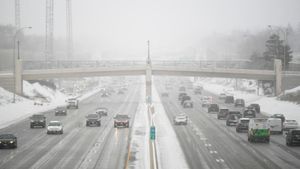California's Governor Gavin Newsom has stirred controversy with his recent proposal to revive the state's electric vehicle (EV) rebate program, potentially excluding Tesla from the benefits. This newly proposed initiative emerges amid concerns surrounding federal tax credits for electric vehicles and aims to support zero-emission vehicle sales throughout the state.
The backdrop for this discussion is significant, particularly with President-elect Donald Trump signaling intentions to eliminate the existing $7,500 federal tax rebate for EVs as part of his broader auto industry strategy. Newsom's administration responded swiftly with plans to reintroduce the EV tax credits if the federal incentives were axed. He stated firmly, "We will intervene if the Trump Administration eliminates the federal tax credit, doubling down on our commitment to clean air and green jobs in California." The funding for this relaunch is expected to source from California's Greenhouse Gas Reduction Fund, which is financed by oil companies under the state's cap-and-trade system.
Yet the proposal hasn't gone without backlash. Lawmakers from both major parties have taken issue with the inclusion of a market-share cap, which could restrict larger manufacturers, such as Tesla, from participating. Tesla, the top player with about 55% market share of EV sales within the state, could see its exclusion labeled as politically motivated by critics.
Elon Musk, the CEO of Tesla, publicly expressed his frustration, making clear, "Even though Tesla is the only company who manufactures their EVs in California! This is insane." His indignation was echoed by local lawmakers, like Democratic Representative Ro Khanna, who emphasized the need to prioritize California's manufacturing sector rather than allowing political circumstances to dictate economic opportunities. He stressed, "Let’s not play politics with keeping manufacturing in California. It would be foolish to exclude Tesla."
Krystal Moore, another lawmaker, also expressed strong opposition to the proposed plans, arguing it could undermine statewide efforts to promote clean energy alternatives.
Newsom's office maintained, though, the intention behind the market cap is to boost competition and diversify the zero-emission vehicle market, correlatively helping new firms to thrive alongside established giants like Tesla.
The proposed EV rebates could serve as a new edition of the defunct program which, having initially been launched 13 years ago, distributed around $1.49 billion to over 594,000 vehicles before its phase-out last year. The governor’s vision is to reestablish consumer confidence and maintain California's leading edge as the leader of EV sales, which represented 26.4% of the new car market as of the third quarter of 2024. Newsom aims to restore the rebates to help offset initial purchase costs, expand the accessibility of EVs throughout Californian communities, and commit to ambitious zero-emission vehicle targets, such as 100% of new car sales by 2035.
Yet this initiative has raised questions about how automakers might respond to these subsidies, including concerns over whether they may increase sticker prices correlated with potential tax credits.
Rounding off the conversation, some experts hinted at the political undercurrents fueling decisions surrounding EV policies. They noted the divergence between Newsom, who stands against the incoming Trump administration, and Musk, who has reportedly aligned himself with Trump, can complicate cooperative efforts to advance California’s ambitious EV goals.
For now, the political clash and the future of California's EV rebate program remain very much in question.



